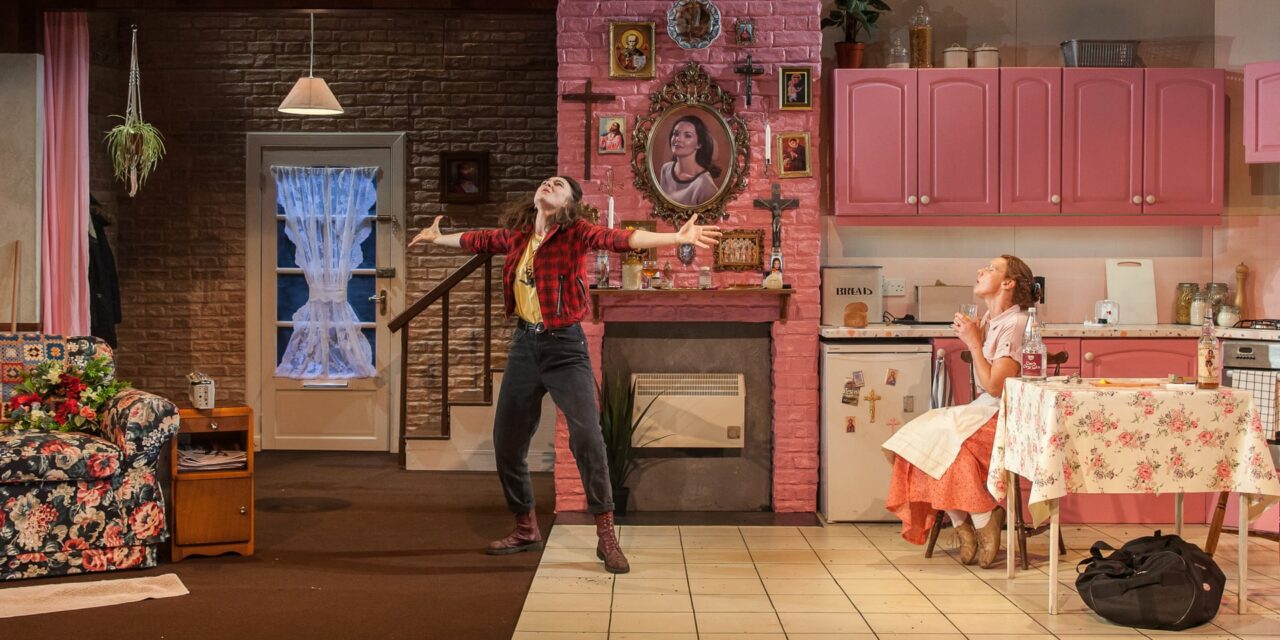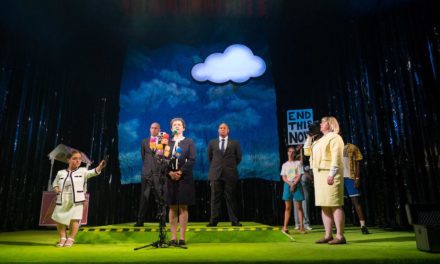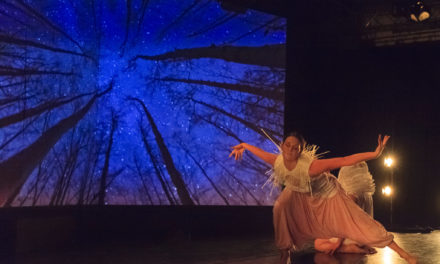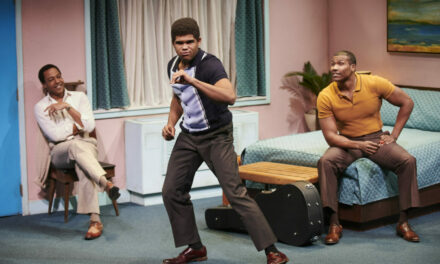Sisterhood and female companionship were at the heart of some of the most popular plays at the Edinburgh Fringe this year. These female-driven pieces took a long, hard look at the complex bonds—and tensions—among women of different ages, backgrounds, and temperaments. Here are some productions that attest to the wide array of feminisms being imagined and interrogated on the contemporary stage.
Let us begin in the family. The Wardrobe Ensemble’s The Last of the Pelican Daughters (Pleasance), developed with Complicité, is an engaging and at times moving drama about the four Pelican sisters struggling with grief, with their memories, and with one another in the aftermath of their mother’s demise. Each considerably different from the others, the sisters reunite at their childhood apartment to commemorate their mother on her birthday, but it does not take long for a series of revelations and requests to put pressure on their delicate equilibrium.
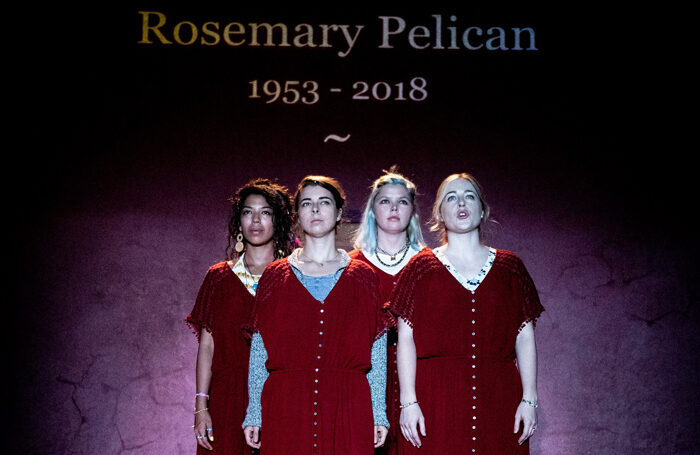
The Wardrobe Ensemble’s The Last of the Pelican Daughters at the Pleasance Courtyard. Photo: Graeme Braidwood
With vividly drawn, though somewhat two-dimensional, characters, the play exudes much confidence and daring in its plot maneuvers and over-stylizations. Direct addresses to the audience, occasional use of projections, and frequent flashbacks are among the elements that make this a dynamic watch, but there is also the sense that the play’s dramaturgy is still not settled, and vulnerable to inconsistencies. In its toying with conventional realism, The Last of the Pelican Daughters is full of exciting potential, but it would have benefitted from a more selective authorial hand, given that it has been written and devised by the ensemble.
In Charley Miles’ Daughterhood (Roundabout), there are only two sisters, but the increasing friction between them would be enough for more. In what is essentially a long string of fights between Pauline and Rachel, Miles grapples with issues of filial responsibility, caregiving, and sibling rivalry. That the play is interspersed with non-chronological scenes from the sisters’ respective pasts does not always contribute meaningfully to our understanding of their current vexations. With dialogue occasionally falling into triteness, and the central storyline interrupted too often, Daughterhood does not have the acuity one would expect from its otherwise intriguing premise. There is one moment, however, that deserves mention. Towards the end, Pauline launches into an eloquent and quietly shattering anecdote about encountering four whales stranded on a beach. What she says then, about the ingrained primacy of family loyalty, has a poignant bearing on what the play is itching to put its finger on. One is left wishing that the work was suffused more with the spirit of that speech.
Tensions run high in Meghan Tyler’s Crocodile Fever (Traverse Theatre). So high, that by the end of what starts out as a kitchen-sink realist play the stage is drenched in blood and occupied by the puppet of an enormous crocodile. In Northern Ireland of 1989, two estranged sisters, Alannah and Fianna, reunite reluctantly, and before they know it, they are in violent revolt against their manipulative father, their troubled family history, and perhaps even the woes of their nation. Powered by exceedingly strong performances by Lisa Dwyer Hogg and Lucianne McEvoy, and Gareth Nicholls’s meticulously vibrant direction, Crocodile Fever charts an allusive trajectory to a bloody catharsis that is as psychological as it is symbolic. Even though the sociopolitical context remains too dim, and the ending goes a bit too far in its outrageousness, this is a boldly imagined piece that thinks about what it takes to rejuvenate the sisterly bond, and why that might be necessary.
Stef Smith’s Enough (Traverse Theatre) finds such necessity not between biological sisters, but between two female colleagues who work as flight attendants. In this probingly poetic exploration of the female psyche under pressure from many fronts, the two characters’ profession—signifying safety, crisis management, and etiquette—serves as a fitting amplification of the social personas in which they feel trapped. Smith’s crisp language creates a layered world of introspection, intersubjectivity, and action, where the increasingly intimate relationship between the two women proves at turns injurious and healing. Though some of the scenic shifts feel rushed, and the set design somewhat underwhelming, this is a robust and darkly glowing look at what it means to stay on board when all around is turbulence, whether immediate or impending.
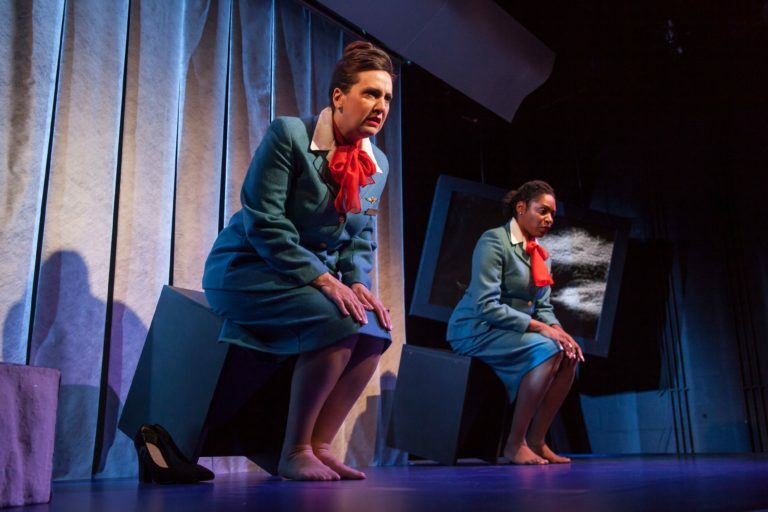
Louise Ludgate and Amanda Wright in Enough at Traverse Theatre. Photo: Lara Cappelli
A different model of female companionship, less overt but more hard-hitting, runs through the veins of Gina Moxley’s The Patient Gloria (Traverse Theatre). In this feminist anthem of uncanny zest, we witness an outrageous but tight dismantling of the phallocentric, patriarchal imaginary. At its core, Moxley’s piece is a highly theatrical critique of Three Approaches to Psychotherapy, a series of educational films from 1965 in which a woman named Gloria Szymanski undergoes real-life therapy with three therapists, each with a markedly different method. Focalized through the alarming power dynamics of psychotherapy at its modern roots, the resulting re-creations of these three sessions are accompanied by running commentary, live music, and—yes—a flying penis. With superb performances, polemical humor, and a healthy dose of self-awareness, The Patient Gloria becomes a patiently earned glory.
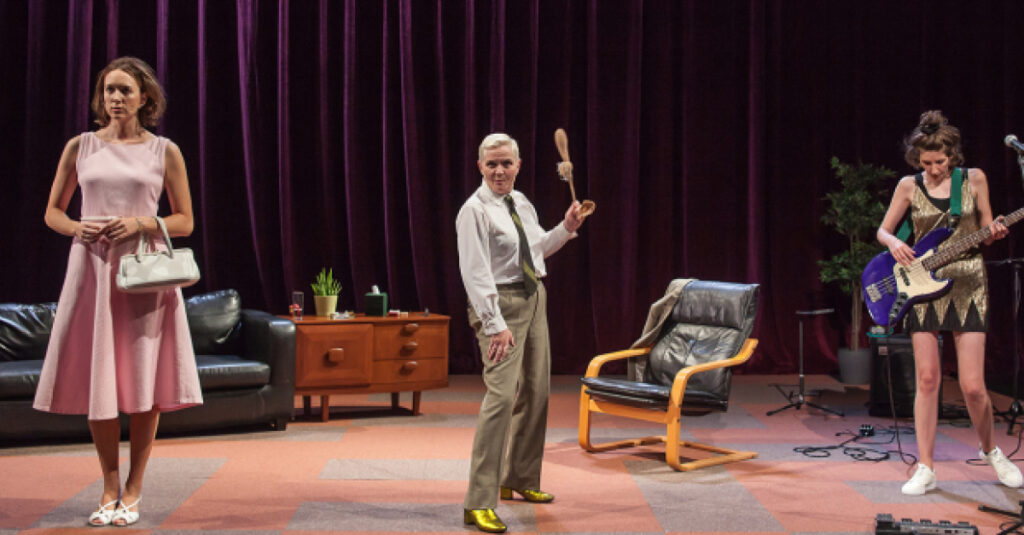
Liv O’Donoghue, Gina Moxley, and Jane Deasy in The Patient Gloria at Traverse Theatre. Photo: Lara Cappelli
In its playful adherence to historical facts, Breach Theatre’s It’s True, It’s True, It’s True (Underbelly) swims in similarly inquisitive waters. This shrewd and lean reconstruction of the painter Artemisia Gentileschi’s 1612 rape trial addresses our present moment with effortless force and an unexpected sense of humor. As a piece of verbatim theatre, It’s True… is based on court transcripts that have survived from a seven-month trial in Renaissance Rome, but it takes admirable liberties in the ways in which it frames and questions these legal episodes. Role-swapping, contemporary music, and art-historical asides are handsomely blended to convey a feminist politics that seems to take a firm stand against our so-called post-truth era. A fabulous cast of three—Kathyrn Bond, Sophie Steer, and Harriet Webb—and nearly flawless direction by Billy Barrett are behind this exemplary concoction.
It might seem odd to group Margaret Perry’s one-woman play Collapsible (Assembly) with these works, but rest assured that it, too, makes an unpredictable case for reaching beyond the solipsistic self and finding salve in companionship. This free-fall, fleetingly Beckettian account of existential despair heaves with vibrant language and a delectably commanding, well-modulated performance by Breffni Holahan. Stranded on an elevated platform, feet dangling, eyes glowing, Holahan gives life to an Essie on the brink of letting everything go. She no longer has a job, a girlfriend, or any sense of being grounded—so she lets us into her overactive, anxious mind. What is gleaned in that darkness is a profound sense of uprootedness that unravels further over the course of the play. Perry’s careful, even sly shifts between the internal and the external, the random and the momentous, build up to an impressive conclusion—at once subtle and life-affirming.
This post was written by the author in their personal capacity.The opinions expressed in this article are the author’s own and do not reflect the view of The Theatre Times, their staff or collaborators.
This post was written by Mert Dilek.
The views expressed here belong to the author and do not necessarily reflect our views and opinions.

